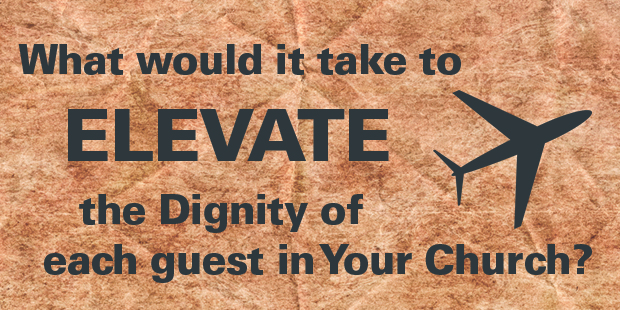
What Would It Take to Elevate the Dignity of Each Guest in Your Church?
The guest that enters our church should feel welcomed, comfortable, and honored.
I am obsessed with exploring the answer to one question: What would it take to elevate the dignity of each guest in our church?
I attended a Guest Services Conference this week, and also had the opportunity to speak during a session to the group of influencers. I asked everyone one question, “What would it take to elevate the dignity of each guest in our churches?” To better set the stage, we watched this funny video of Target lady from SNL on how not to elevate the dignity of each guest.
I believe the answer to the above question is discovered when we unearth and respond to eight subsequent questions.
Question 1: Do we allow our interactions with a team member and guest to remain active in front of the backdrop of hospitality?
“From a sociological perspective, hospitality was the bedrock of the Middle Eastern culture because only by caring for others could societies, or even individuals, guarantee their survival.The harsh, arid climate, coupled with the nomadic lifestyle of the region’s early residents, made kindness towards guests an imperative. To deny a traveler hospitality – whether it be someone familiar to you or someone completely unknown – was to deny them life. Like any society, a mutual understanding arose that those who were in need could find relief at any house, and would repay the kindness whenever a stranger or guest came knocking at their door. Hospitality found its cultural staying power in the exchange of mutual survival, the willingness to see the value in another life because your life is bound to it, even if not obviously so.
From a theological perspective, the first acts of hospitality were not from human to human – they were from God to man via creation and His grace in the aftermath of the Fall. The specificity of the universe, its fine-tuning and precision, are the first and most excellent examples of creating an environment for guests that makes them feel at home and frees them to interact with God. In the Fall, we see God’s graciousness (which is the root of all hospitality – the extension of grace to the weak) in the fact that he provided clothes to cover their nakedness and a closing off of the Tree of Life to ensure that mankind wouldn’t die in sin. The implications of both of these acts formed a clear through-line for Semitic culture and history: human life is precious, and must be cared for and shown grace. This belief was codified in the Mosaic Law with its statutes on how to treat strangers and sojourners among the Nation of Israel.
Romans 12:13…’practice hospitality’ is included in the list of qualities of a Christ follower. These two words mean one who goes after someone unfamiliar with an environment. You pursue them as if you were pursuing a criminal or enemy. However, you are doing it because you have a love for the stranger.”
Question 2: Are the feelings we have for a guest coming in reflected in how they feel about us when they leave?
“Yes. The Image of God is not selective; it does not appear in some people and disappear in others. All human beings bear the Image and thus have the ability to be moved by displays of the Image in another person. Human beings are wired for goodness—and the best way to draw goodness out is pour goodness in. We see this image most fully in the person of Jesus Christ and in his interactions during his ministry. If you consider how Jesus treated the marginalized, sick, and lost, you see he brought people to faith not by doctrinal savvy but by touch, compassion, and kindness. Jesus brought out the good in people by extending goodness to them—he resurrected the image of God by deliberately appealing to it in his work.”
Question 3: Does our church culture provide freedom for team members to make quick decisions that create a better experience for the guest?
“Is caring for people assigned to a specific team (i.e., Guest Services) or is it the responsibility of everyone regardless of an ‘official’ role – staff and volunteers. The church that has the guest as the priority in its DNA empowers volunteers to make quick decisions to care for the guest. This is seen and felt from the top down.
Think of a something being widespread versus isolated. If something is widespread, everyone in the midst feels it. When something is isolated, only a few are involved and feel the impact.”
Question 4: Do we empathetically prioritize the guest enough to naturally go the second and third mile?
“Do we prioritize the guest so much that it becomes our DNA to never think of going the extra mile as the exception? Rather, we gladly go as many miles as it takes to deliver a feeling of comfort and care. This becomes the expectation and norm.
Our view of three words influence our response to this question:
1. Hospitality – focus is on the guest and the feeling being delivered
2. Service – focus is only on the actions
3. Entertain – focus is on you, the experience provider”
Question 5: Do we break the big picture down into scenes that are more manageable and yield a better guest experience?
“Designing an end-to-end experience can be overwhelming. Writers, directors, and producers, don’t write and shoot everything in one scene. They break it down into manageable and individual scenes and then thread them together. Start small and then thread it together. Your experience will be better!”
Question 6: Do we discipline ourselves and help our team members to be fully present?
“Jesus came into a house. Martha was busy doing and Mary was fully present with the person who mattered. One was caught up in doing everything but hosting the person. Jesus said what Mary was doing was better.
When we choose to be fully present, we are telling the guest that we value them above everything, even all that must get done.”
Question 7: Do we lead in such a way that our team members feel empowered to show care in ways that the guest has a story to tell later?
“Every guest drives on our properties and walks into our buildings with a story that involves a number of characters, mountaintop moments, tragedies, and baggage. Perhaps they have even had a bad church experience in their past. When we posture ourselves to be sensitive to the person driving on our property or walking in our building, we are better prepared to listen and respond.
The main person in the story is not the church. It is not the team member. It is the guest and they should feel that from us. We can influence their experience with us so that they have a story to tell later. We are influencing environments where life change happens.”
Question 8: Do we focus on brokering an experience for the guest in order to protect them?
“A bodyguard shields the person they are responsible for guarding. We are trusted with protecting each guest from any feeling that might be a distraction in their experience with us. We have the opportunity to replace an insecurity or negative emotion they have with a positive emotion.”
Want to know more about Guest Experiences in your church? Start a conversation with our team. We’re glad to offer our input. Your vision is at stake, so let’s talk.

Want to learn how to create an EXCEPTIONAL Guest Experience at your church? Check out Auxano’s Guest Experience Boot Camp in Cincinnati, OH on August 7-8.

Tags: Church Guest Experiences, Church Guest Services, Dignity, Dignity of Your Guests, Guest Experiences, Guest Services, Jason Young












